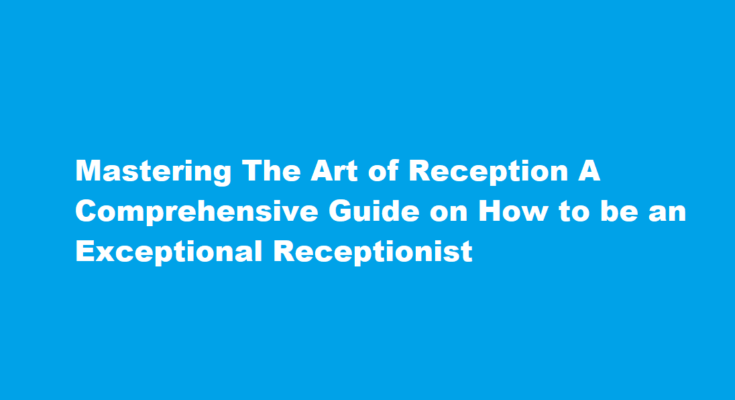Introduction
The role of a receptionist is crucial in any organization as they serve as the face and voice of the company. A skilled receptionist not only greets visitors and handles phone calls but also plays a pivotal role in creating a positive first impression. This article aims to provide a comprehensive guide on how to be an exceptional receptionist, offering tips and techniques to ensure professionalism, efficiency, and outstanding customer service in this vital role.
Develop Excellent Communication Skills
As a receptionist, communication is at the core of your responsibilities. Hone your verbal and written communication skills to ensure clarity and effective interaction with visitors and colleagues. Speak with a clear and friendly tone, maintain a positive demeanor, and always listen attentively to the needs of callers or visitors. Furthermore, refine your written communication for email correspondence, ensuring a professional and courteous tone.
Master Time Management
Being a receptionist demands excellent time management skills. Prioritize tasks, handle phone calls promptly, and manage appointments efficiently. Create a daily schedule, allowing time for breaks and unexpected situations. Proper time management ensures a smooth flow of work and demonstrates your dedication to providing quality service.
Embrace Technology
Today’s receptionist must be tech-savvy to handle various software and communication tools efficiently. Familiarize yourself with office equipment, such as phone systems, computers, and printers. Additionally, learn to use scheduling software, customer databases, and email platforms. Embracing technology enhances your productivity and enables you to streamline processes effectively.
Exhibit Professionalism and Poise
As a receptionist, professionalism is of utmost importance. Dress appropriately for the work environment, maintain good hygiene, and be punctual. Always greet visitors with a warm smile and a friendly attitude. Keep personal calls and distractions to a minimum during working hours to ensure you are fully present and attentive to your responsibilities.
Cultivate Empathy and Patience
Empathy and patience are crucial traits for any receptionist. Understand that visitors or callers may be dealing with various emotions or concerns. Approach each interaction with empathy and offer a patient ear. Show understanding and take the time to address their needs, ensuring they feel valued and heard.
Handle Difficult Situations Gracefully
In the role of a receptionist, you may encounter challenging situations or encounter upset individuals. Learn to remain composed and handle such situations gracefully. Avoid arguments and adopt a diplomatic approach, defusing tension and finding appropriate solutions.
Maintain a Tidy and Organized Workspace
A well-organized workspace not only enhances your efficiency but also leaves a positive impression on visitors. Keep your desk clutter-free and maintain a tidy reception area. Organize documents and supplies systematically to access them quickly when needed.
Be Proactive and Anticipate Needs
A proactive receptionist is a valuable asset to any organization. Anticipate the needs of visitors and colleagues and address them before they arise. Offer assistance, provide relevant information, and be ready to lend a helping hand whenever required.
FREQUENTLY ASKED QUESTIONS
What qualifications do I need to be a receptionist?
You may not need any formal qualifications to apply directly for work as a receptionist. It will help to have good admin and customer service skills. Some employers will prefer you to have a good general education, with GCSEs and IT skills to work with computerized booking or payment systems.
How do I start being a receptionist?
Receptionists usually need to have a high school diploma or the equivalent and some office experience. Some positions require advanced skills such as Microsoft Office Suite knowledge or medical terminology familiarity. Some employers also require a typing test before hiring a receptionist.
Conclusion
Being an exceptional receptionist requires a combination of excellent communication skills, time management, professionalism, empathy, and organizational abilities. By mastering these essential traits, you can excel in your role and contribute significantly to creating a positive and welcoming environment for everyone who interacts with your organization.
Read Also : Maximizing Visitor Information Collection Strategies for Informed Engagement



